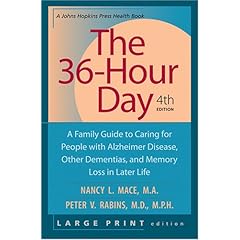Balance and walking problems often present before the diagnosis of mild cognitive impairment, Alzheimer's or dementia...By Bob DeMarco
Alzheimer's Reading Room

My name is Bob DeMarco, I am an Alzheimer's Caregiver. My mother Dorothy lived with Alzheimer's Disease. We lived our lives one day at a time. IAAAC is a companion site of the Alzheimer's Reading Room.
Balance and walking problems often present before the diagnosis of mild cognitive impairment, Alzheimer's or dementia...By Bob DeMarco

Doctors are not good at diagnosing Alzheimer's and neither are spouses or children.....By Bob DeMarco
Do not argue with them. It gets you nowhere......By Carole Larkin
 If I had paid attention sooner, would it have made a difference in her diagnosis? I'll never know for certain.
If I had paid attention sooner, would it have made a difference in her diagnosis? I'll never know for certain.Subscribe to The Alzheimer's Reading Room
“We think doctors may be prescribing more medications because the patients aren't giving them the right information about what they are taking ..... I've seen patients who continued on drugs that I told them to discontinue and stop taking drugs I never told them to stop using."Doctors rely on patients to accurately tell them what prescription medications - and what dosages -- they are taking in out-patient visits. (A patient's chart may not always be available or complete.) That information is essential for physicians to monitor whether a drug is working, and whether it may have adverse interactions with any new medications prescribed.
Bob DeMarco is an Alzheimer's caregiver and editor of the Alzheimer's Reading Room. The Alzheimer's Reading Room is the number one website on the Internet for advice and insight into Alzheimer's disease. Bob taught at the University of Georgia, was an executive at Bear Stearns, the CEO of IP Group, and is a mentor. He has written more than 700 articles with more than 18,000 links on the Internet. Bob resides in Delray Beach, FL.
Doctors are finally starting to get compensated for online consultations with patients, but whether the practice will catch on is another story. Aetna recently took a three-state pilot project nationwide, and Cigna plans to start paying for Web visits next year, the Philadelphia Inquirer reports. Both companies contract with RelayHealth Patients typically pay the same co-pay whether they go to the doctor or have a Web consult. Insurers pay doctors less for the Web consult — typically $25 to $35, according to the Inquirer.
|

This is an interesting and thought provoking article that highlights the problems often effecting Alzheimer's care giver's.
